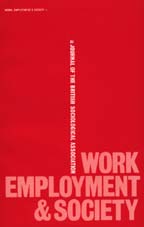Crossref Citations
This article has been cited by the following publications. This list is generated based on data provided by
Crossref.
Fergusson, Ross
2002.
Rethinking Youth Transitions: Policy Transfer and New Exclusions in New Labour's New Deal.
Policy Studies,
Vol. 23,
Issue. 3,
p.
173.
Charlton, Tony
Panting, Charlotte
and
Hannan, Andrew
2002.
Mobile telephone ownership and usage among 10- and 11-year-olds.
Emotional and Behavioural Difficulties,
Vol. 7,
Issue. 3,
p.
152.
Davie, Ronald
Panting, Charlotte
and
Charlton, Tony
2004.
Mobile phone ownership and usage among pre-adolescents.
Telematics and Informatics,
Vol. 21,
Issue. 4,
p.
359.
Lindsay, Colin
and
McQuaid, Ronald W.
2004.
Avoiding the ‘McJobs’.
Work, Employment and Society,
Vol. 18,
Issue. 2,
p.
297.
Canny, Angela
2004.
What employers want and what employers do: Cumbrian employers' recruitment, assessment and provision of education/learning opportunities for their young workers.
Journal of Education and Work,
Vol. 17,
Issue. 4,
p.
495.
Garrod, Guy
and
Whitby, Martin
2005.
Strategic Countryside Management.
p.
1.
Phimister, Euan
Theodossiou, Ioannis
and
Upward, Richard
2006.
Is it Easier to Escape from Low Pay in Urban Areas? Evidence from the United Kingdom.
Environment and Planning A: Economy and Space,
Vol. 38,
Issue. 4,
p.
693.
Ranzijn, Rob
Carson, Ed
Winefield, A. H.
and
Price, Debbie
2006.
On the scrap‐heap at 45: The human impact of mature‐aged unemployment.
Journal of Occupational and Organizational Psychology,
Vol. 79,
Issue. 3,
p.
467.
LILLY, MEREDITH B.
LAPORTE, AUDREY
and
COYTE, PETER C.
2007.
Labor Market Work and Home Care's Unpaid Caregivers: A Systematic Review of Labor Force Participation Rates, Predictors of Labor Market Withdrawal, and Hours of Work.
The Milbank Quarterly,
Vol. 85,
Issue. 4,
p.
641.
Jacob, Marita
2008.
Unemployment benefits and parental resources: what helps the young unemployed with labour market integration?.
Journal of Youth Studies,
Vol. 11,
Issue. 2,
p.
147.
Hodgkinson, Ian R.
and
Hughes, Paul
2012.
A level playing field: social inclusion in public leisure.
International Journal of Public Sector Management,
Vol. 25,
Issue. 1,
p.
48.
Culliney, Martin
2017.
Escaping the rural pay penalty: location, migration and the labour market.
Work, Employment and Society,
Vol. 31,
Issue. 3,
p.
429.
Izgarskaya, A. A.
and
Chernykh, S. I.
2020.
The Internationalization of Science and Education as a Global Process: a World-System Approach.
Discourse,
Vol. 5,
Issue. 6,
p.
42.
Koç, Tuğba
and
Turan, Aykut Hamit
2021.
The Relationships Among Social Media Intensity, Smartphone Addiction, and Subjective Wellbeing of Turkish College Students.
Applied Research in Quality of Life,
Vol. 16,
Issue. 5,
p.
1999.
Abouelenin, Mariam
and
Hu, Yang
2023.
Maternal Employment Shapes Daughters’ Employment Stability in Egypt: Evidence for the Intergenerational Transmission of Labor Force Attachment.
Sex Roles,
Vol. 88,
Issue. 1-2,
p.
35.




